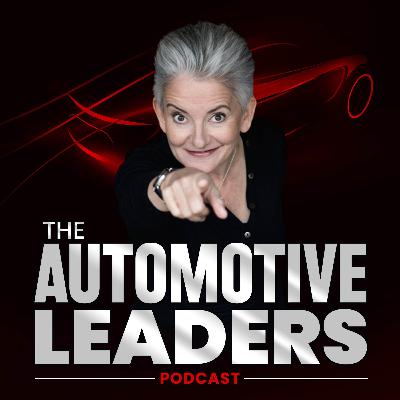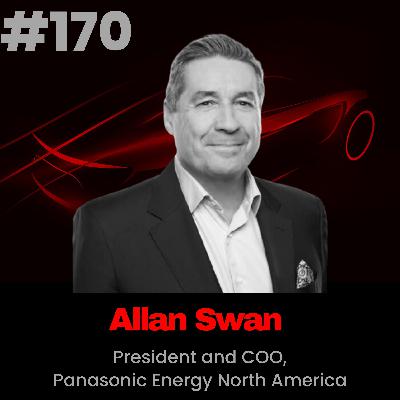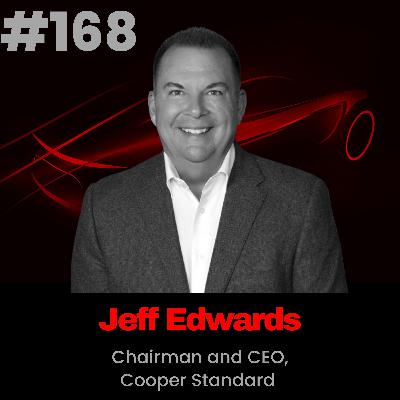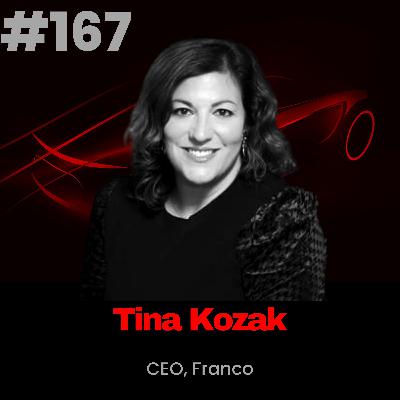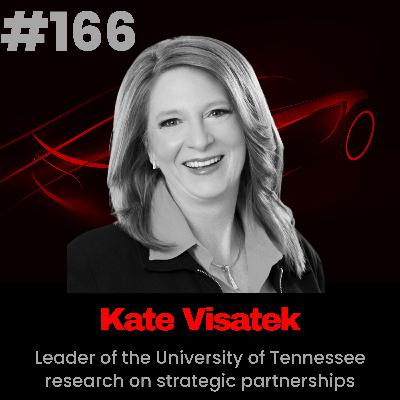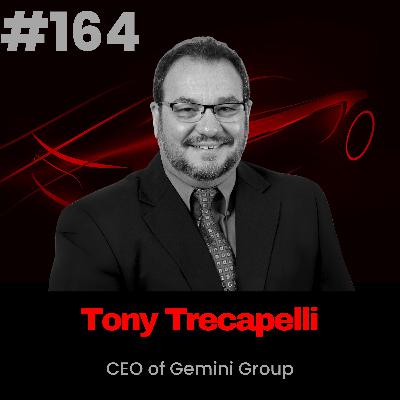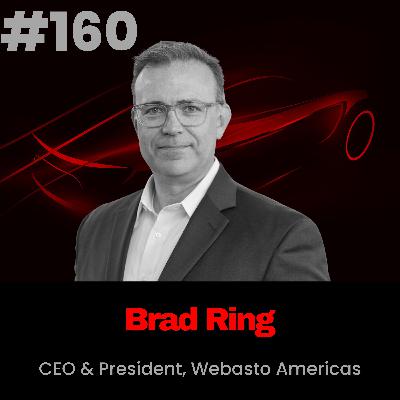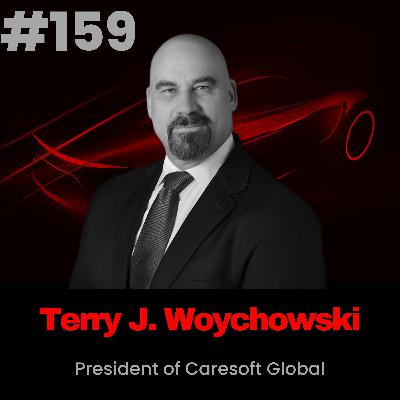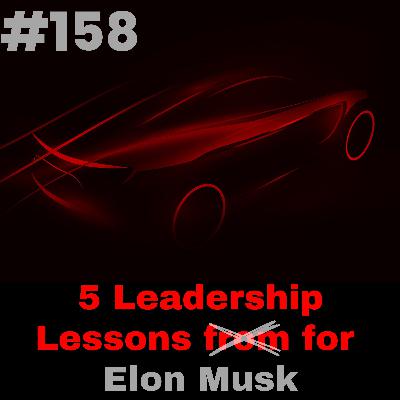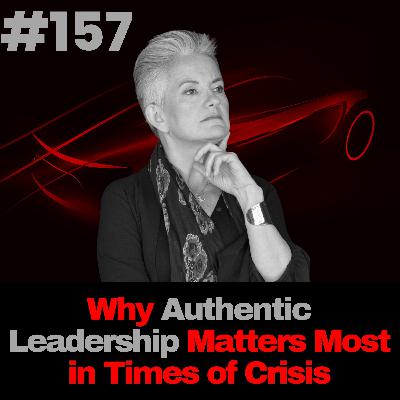Discover The Automotive Leaders Podcast
The Automotive Leaders Podcast

The Automotive Leaders Podcast
Author: Jan Griffiths
Subscribed: 19Played: 297Subscribe
Share
© @gravitasdetroit
Description
Prepare yourself, your team, and your business for the future of automotive.
We are all evolving the products we make, have you thought about the leadership model to get us there?
In-depth interviews with leaders, authors, and thought leaders, provide the insights you need.
This podcast is brought to you by Gravitas Detroit.
We are all evolving the products we make, have you thought about the leadership model to get us there?
In-depth interviews with leaders, authors, and thought leaders, provide the insights you need.
This podcast is brought to you by Gravitas Detroit.
176 Episodes
Reverse
This conversation doesn’t sugarcoat anything. The auto industry is under real pressure, and leaders can’t afford denial or delay.In this episode of the Automotive Leaders Podcast, Jan Griffiths sits down with Jamie Butters, now an independent journalist, speaker, emcee, and content creator who has spent decades reporting from every corner of the automotive ecosystem.Jamie brings a clear, grounded view of where the industry stands at the start of 2026. China’s competitive advantage is no longer theoretical. Affordability is becoming an existential issue. Tariffs and geopolitics are injecting uncertainty that freezes investment. AI is everywhere, but leaders still struggle to separate real value from noise.They unpack why legacy automotive culture slows decision-making, how bespoke thinking drives unnecessary cost, and why speed is now a leadership requirement, not a nice-to-have. The conversation also digs into Tesla’s influence on manufacturing thinking, the future of dealer AI tools, and what’s at stake as the UAW heads into a pivotal leadership year.This episode is about reality. Not hype. Not fear. Just the hard truths automotive leaders need to face if they want to compete, adapt, and lead with courage.Themes Discussed in this EpisodeWhy China’s scale and speed threaten global incumbentsHow affordability became automotive’s silent crisisWhere AI delivers value and where it quietly creates wasteThe cultural cost of bespoke thinking in legacy organizationsTariffs, uncertainty, and their chilling effect on investmentWhat UAW leadership changes could mean for competitivenessWhy speed of decision-making is now a core leadership skillThis episode is sponsored by Lockton, click here to learn moreFeatured GuestJamie Butters is an independent automotive journalist, speaker, emcee, and content creator. He previously served as Executive Editor and Chief Content Officer at Automotive News, Detroit bureau chief for The Wall Street Journal, and automotive editor at Bloomberg. Jamie is known for connecting the dots early, telling the truth plainly, and translating complex industry dynamics into language leaders can actually use.About Your Host – Jan GriffithsJan Griffiths is a champion for culture transformation and the host of the Automotive Leaders Podcast. A former automotive executive with a rebellious spirit, Jan is known for challenging outdated norms and inspiring leaders to ditch command and control. She brings honesty, energy, and courage to every conversation, proving that authentic, human-centered leadership is the future of the automotive industry.Mentioned in this EpisodeAutomotive News
Re-industrializing America sounds bold. Necessary. Inevitable.But on factory floors across the country, automation keeps stalling before it ever delivers real value.Robots sit unused. Projects drag on for years. Leaders know automation is essential, yet decisions stall, risks get avoided, and the same problems repeat. This episode goes straight to the heart of why.Jan Griffiths is joined by Søren Peters, CEO of HowToRobot, a global marketplace helping manufacturers source and implement robotics more effectively. Søren has spent decades leading digital transformation and operational change, giving him a front-row seat to why automation struggles inside real plants, not PowerPoint decks.This conversation moves past hype. It tackles the real blockers: fear-based leadership, siloed decision-making, short-term contracts, poor education, and a complete lack of ownership once robots hit the shop floor. Automation doesn’t fail because the technology isn’t ready. It fails because organizations aren’t.Søren challenges leaders to rethink how they assess risk, train their workforce, and take responsibility for change. Buying a robot isn’t a technology decision. It’s a leadership decision. And without courage, clarity, and accountability, even the smartest automation strategy will collapse.If the automotive industry is serious about rebuilding manufacturing capacity, closing labor gaps, and preparing for an AI-enabled future, leaders must stop waiting for certainty and start owning the change.Themes DiscussedWhy automation failures are leadership failures, not technology failuresThe risk-avoidance mindset is slowing manufacturing transformationHow siloed decision-making kills automation on the shop floorWhy education matters beyond engineers and integratorsThe hidden impact of short-term supplier contracts on ROIWhat successful automation leaders do differentlyWhy ownership and courage matter more than toolWatch the full video on YouTube - click hereThis episode is sponsored by Lockton, click here to learn moreFeatured GuestSøren Peters is the CEO of HowToRobot, a global industrial robot marketplace that helps manufacturers find, evaluate, and implement automation solutions more effectively. He has spent over two decades leading companies through digital transformation, outsourcing, and large-scale operational change across Europe and the United States. Søren brings a pragmatic, leadership-first perspective to automation, grounded in what actually works inside manufacturing plants.About Your Host – Jan GriffithsJan Griffiths is a champion for culture change and the host of the Automotive Leaders Podcast. A former automotive executive with a rebellious spirit, Jan is known for challenging outdated norms and inspiring leaders to ditch command and control. She is the author of AutoCulture 2.0 and the...
2025 didn’t just challenge the automotive industry.It exposed it.Tariffs that shifted overnight. Another chip crisis. A sudden rethink on EVs. Then Ford dropped the bomb: nearly $20 billion in charges as it pivoted away from EVs, stranding capital across the supply chain. And on top of it all, AI is moving faster than most leaders can keep up with.In this solo episode, Jan Griffiths presses pause on the noise and calls it what it really was: feedback.Not chaos.A signal.2025 showed us exactly where legacy leadership breaks under pressure. Command-and-control slowed decision-making. Rigid processes collapsed under uncertainty. And waiting for perfect data became a competitive disadvantage.As we step into 2026, Jan lays out what leadership must become if this industry wants to survive, not just react. She challenges leaders to stop pretending they have all the answers and start learning out loud. To trade certainty for curiosity. Ego for humility. Silos for systems thinking.AI is not the threat. Speed is the reality. And culture is still the differentiator.This episode is a direct, honest conversation with leaders who feel the weight of what’s coming and know the old playbook won’t get them there. Jan breaks down the five leadership categories that will define success in 2026 and beyond, and why standing still is no longer an option.If 2025 cracked the foundation, 2026 is the year leaders decide whether to rebuild or repeat the same mistakes.Watch the full video on YouTube - click hereThis episode is sponsored by Lockton, click here to learn more Themes DiscussedWhy 2025 wasn’t chaos, but critical feedback for automotive leadersThe leadership behaviors that failed under pressureLearning out loud instead of waiting for perfect answersIntellectual humility as a competitive advantageWhy speed now matters more than certaintyHow AI is forcing a shift away from rigid org chartsThe leadership mindset required to win in 2026About Your Host – Jan GriffithsJan Griffiths is a champion for culture change and the host of the Automotive Leaders Podcast. A former automotive executive with a rebellious spirit, Jan is known for challenging outdated norms and inspiring leaders to ditch command and control. She is the author of AutoCulture 2.0 and the co-host of the Auto Supply Chain Prophets podcast. Jan brings honesty, energy, and courage to every conversation, proving that authentic, human-centered leadership is the future of the automotive industry.Mentioned in this EpisodeAI‑Era Leadership Self‑Assessment Episode Highlights[01:26] Reflecting on 2025: Challenges and Lessons[04:32] Leadership Traits for 2026[04:45] Mindset and...
Sometimes a conversation hits so deeply that it demands a part two , and that’s exactly what happened after our episode with MIT’s Dr. Bryan Reimer. The response was immediate, and the very first message came from CADIA CEO Cheryl Thompson, who had been quietly diving deep into AI for months. Her reaction captured what so many leaders are feeling right now: excitement, overwhelm, fear, and possibility all at once.This episode brings Cheryl and Bryan together to talk about what AI is really doing inside companies — not the hype, but the human impact. The emotional truth? AI is forcing us to look hard at our culture, our trust levels, and our willingness to unlearn the habits that hold us back. That’s where transformation starts.Cheryl shares how AI has changed the way she works, creates, leads, and even manages her daily life. But she’s honest about the trap many leaders fall into: using AI to produce more… instead of stepping back to breathe, think, and lead. Bryan brings the research lens, grounding the conversation in what AI can do, what it can’t, and how leaders must shift from delegation to collaboration if they want AI to be truly useful.Together they unpack psychological safety, generational differences, the rise of agentic AI, and the cultural tension AI exposes inside legacy automotive. And they remind us that AI will not replace leaders — but leaders who use AI well will absolutely outpace those who don’t.This isn’t a conversation about technology. It’s a conversation about courage, trust, and the future of leadership in an industry that desperately needs to move faster while staying true to its values. Themes Discussed in This EpisodeHow trust and culture determine whether AI succeeds or stallsWhy leaders must collaborate with AI instead of delegating blindlyWhat the Wow, Whoa, Grow framework reveals about human behaviorHow generational differences shape AI adoption and comfort levelsWhy AI in automotive demands unlearning old processes, not just adding toolsThe risk of locking down AI too tightly — and the risk of letting it run wildHow small businesses and startups are using AI to outrun traditional OEMsWatch the Full Video on YouTube - click hereThis episode is sponsored by Lockton, click here to learn moreFeatured GuestsCheryl Thompson, CEO, CADIACheryl leads the CADIA: Culture Evolved, where she equips organizations to build equitable, high-performing cultures. A former manufacturing engineering leader in the automotive industry, Cheryl is known for her human-centered approach to leadership, her commitment to psychological safety, and her skillful integration of AI into learning and development. She helps teams work smarter, remove friction, and accelerate change by pairing technology with deep emotional awareness.Dr. Bryan Reimer, Research Scientist, MITDr. Bryan Reimer is a Research Scientist at the MIT Center for Transportation...
AI dominates every conversation in the automotive industry, but very few companies know how to make it truly useful. That focus on real value is what led MIT research scientist Dr. Bryan Reimer to write How to Make AI Useful.The idea began casually over dinner in Lisbon, when someone asked him what he really thought about AI. Bryan didn’t dive into predictions about machines taking over. He focused on something more practical: how AI only matters when it’s built with people in mind.He breaks AI down into three realities: the excitement of what it could do, the fear that follows when we realize what it might do, and the long, steady work required to make it truly valuable. AI can automate the basics and even create new content, but its real strength is amplifying human skill, not replacing it. The goal isn’t an autopilot workforce. It’s a copilot.That means the fear that AI will take jobs is misplaced. AI changes work; it doesn’t erase it. Just as assisted driving has changed how we drive, rather than removing the driver, AI will shift roles and demand new skills. Bryan points out that layoffs blamed on AI are often just business decisions wearing a convenient mask. The real question is how companies use AI to make work better rather than cheaper.To do that, leaders in automotive need to unlearn old habits. Years of rigid processes, slow decision-making, and fear of change make it hard for AI to deliver value.He argues that useful AI requires trust and transparency. It’s hard for any organization to move forward when fear, hidden approvals, and layers of bureaucracy control decisions. If employees can’t be trusted to make decisions, AI won’t save them. The real challenge is cultural, not technical.Bryan expands the conversation globally. Japan is embracing robotics as companions, while Europe is focusing heavily on privacy. Culture shapes how AI grows, and automotive companies need to pay attention to what consumers value, not just what tech can do.He connects this to China as well. China’s speed is not about dumping features into cars. It’s about building products people can afford and use. If Western brands only chase faster or cheaper without real value, they will lose.AI becomes useful when companies start small, test real-world problems, and continually improve the tool until it actually helps people do their work. That progress may cost more in the beginning, but better safety features, more accurate data, and enhanced customer experiences rarely come from shortcuts. The goal is not to replace people. It’s to build technology that helps them perform at a higher level.Watch the Full Video on YouTube - click hereThis episode is sponsored by Lockton, click here to learn moreThemes discussed in this episode:How AI becomes useful only when it is designed to support human judgment instead of replacing workersWhy the “Wow, Whoa, and Grow” framework helps companies move beyond AI hype and build tools that solve real problemsHow assisted driving proves that advanced technology still depends on human responsibility and oversight to deliver safe, reliable resultsThe importance of unlearning outdated processes before applying AI to existing workflows in automotiveWhy a lack of trust inside automotive organizations slows down AI adoption more than the technology itselfli...
Inside Panasonic’s gigafactories in Nevada and Kansas, machines never stop running. Every second, 70 batteries roll off the line, powered by thousands of people working 24/7. At the center of it all is Allan Swan, a Scotsman who left aerospace to lead one of the most ambitious manufacturing operations in America.Allan begins by explaining what a gigafactory really is and what it takes to manage a workforce of almost 8,000 people while producing billions of batteries a year. At Panasonic, Allan flipped the hierarchy, putting his name at the bottom of the org chart to remind everyone that leaders exist to serve their people. For him, leadership isn’t about hitting KPIs; it’s about getting the people side right first. When communication is clear and employees have what they need to do their jobs, the results follow naturally.He shares how Panasonic built a no-blame culture, where problems are met with curiosity rather than fear. Through a system called CIG — Control, Influence, and Gravity — issues are quickly directed to the people who can resolve them, with no hierarchy or politics in the way. One of his favorite examples is the “door story,” where a small request from a team led to significant changes in trust and teamwork across the plant.Allan also explains how recognition helps maintain high morale in an environment that never stops. Teams celebrate wins every day through thank-you cards, high-five points, and open conversations that connect everyone to the company’s mission. The focus isn’t just on electrification and sustainability, but on providing people with meaningful work that can change their lives.Allan’s approach to leadership is anything but distant. He spends time on the factory floor every day, talking with teams, asking questions, and seeing problems firsthand. For him, leadership means being present and approachable, not hiding behind emails or titles. In the end, Allan’s message to other leaders is simple: real change doesn’t come from massive initiatives or slogans. It begins with small, consistent actions that show people that you care. Fix one problem. Listen to one person. Keep showing up. That’s how culture and performance grow together.Watch the full video on YouTube - click hereThis episode is sponsored by Lockton, click here to learn moreThemes discussed in this episode:The shift from aerospace to EV manufacturing and what it taught Allan Swan about leadershipThe evolution of leadership from command-and-control to people-first management in large-scale manufacturingHow Panasonic’s gigafactories produce 70 batteries every second with a people-driven approachWhy focusing on people before KPIs drives long-term performance across Panasonic’s gigafactoriesHow Panasonic’s Control, Influence, and Gravity (CIG) system helps teams escalate issues and make faster decisionsHow recognition programs such as “Did You Win Today?” and “High-Five Points” help sustain motivation in 24/7 production environmentsThe value of hiring people for energy and mindset rather than industry experience in a new manufacturing sectorHow daily visibility and “gemba walks”...
When people in the automotive world talk about leaders who bring out the best in others, Kim Less's name always surfaces. As Vice President of aftersales for Nissan Americas, she leads a team of more than 1,600 people in the U.S., Canada, Mexico, and South America.Her leadership philosophy? Constant gentle pressure. The phrase, which came from Danny Meyer, perfectly captures how Kim shows up daily. To her, "constant" means persistence and accountability. "Gentle" means having your team's back while guiding them toward growth. And "pressure" is the drive to win, move with urgency, and deliver. Together, they form the balance she strives for: leading with calm confidence but never without expectation.At Nissan, Kim has spent years redefining what aftersales means inside the organization. For her, aftersales isn't an "afterthought," it's the engine that fuels brand loyalty and future sales. Leading across multiple countries means managing different cultures, languages, and expectations. Kim talks about how she's brought the entire Americas region together as one unified team. She does that by traveling to meet teams in person and building relationships and credibility. Over time, those consistent actions turned into a shared culture built on mutual respect and accountability.As the automotive industry evolves, Nissan is focused on simplifying its processes to make quicker decisions. Kim recalls working with the dealer advisory board to streamline 60 dealer-facing programs; removing or simplifying two-thirds to sharpen focus on what truly matters. To her, simplification isn't about doing less; it's about removing distractions so teams can move faster and stay focused on impact.She ties that same thinking to the importance of trust inside organizations. Once people trust each other and the data and systems they rely on, they no longer waste time validating every decision. That's when speed naturally follows. She also reflects on the personal side of leadership and the lessons from finding balance. Earlier in her career, while raising twins, she often hesitated to step away from work for family events. Over time, she learned that setting boundaries wasn't a weakness but a necessity. Now, she mentors others, urging them to "own their calendar," set limits, and protect their well-being. It's advice she lives by and passes down to emerging leaders who often feel pressured to choose between career and personal life.Watch the Full Video on YouTube - click hereThis episode is sponsored by Lockton, click here to learn moreThemes discussed in this episode:How Kim Less applies “constant gentle pressure” to balance accountability, empathy, and performance in leading Nissan Aftersales AmericasThe leadership lessons Kim Less learned from Saturn and GM that shaped her people-first approach at NissanWhy calm leadership and consistency drive stronger team alignment across multiple cultures and regions in the AmericasThe business case for aftersales as a core growth engine that strengthens brand loyalty and customer lifetime valueThe transformation of Nissan’s Aftersales organization through simplification, streamlined programs, and faster decision-makingThe process of uniting 1,600 employees across North and South America under...
How does a 65-year-old automotive supplier reinvent itself for the future? That’s the question Jeff Edwards, Chairman and CEO of Cooper Standard, answers in this episode. With 22,000 employees across 20 countries, Cooper Standard is navigating one of the fastest periods of change in its history; not by clinging to the past, but by transforming how it leads, operates, and builds culture.Jeff explains that the company’s strength begins with its people. Of the ~22,000 employees, 18,000 work in plants every day. They are the heartbeat of the business, and their mindset defines how the company performs. Culture once lived within HR, but today, that’s no longer the case. And at Cooper Standard, every leader owns it. The values and purpose that guide the business aren’t just words in a handbook; they shape decisions, behavior, and priorities across the organization. Jeff reinforces them in quarterly meetings with employees worldwide, making sure new hires understand how the company operates and what it stands for.Jeff explains how Cooper Standard continues to invest in better tools and infrastructure to support faster, more informed decisions — and sees AI as a future opportunity to help teams work smarter.However, Jeff points out that no system works without the right mindset. Change only happens when people are willing to adopt new ways of working together.Jeff also describes how Cooper Standard restructured its organization two years ago into three business units: Fluids, Sealing, and Industrial Specialty. Each has its own president who is responsible for performance. The new setup flattened decision-making and pushed authority closer to the work.Instead of questioning the change, employees embraced it. They wanted to understand how it would improve them, not why it was happening. That response, Jeff says, is the product of a healthy culture built on trust and shared purpose.The conversation closes where every great company story should — with its people. At Cooper Standard, leadership isn’t a title or a process; it’s the daily act of listening, learning, and helping others grow. Decisions are made through conversation, not command. Ideas come from every corner of the company, shaped by the experience of those who build, design, and lead on the floor each day. That shared approach to leadership is what keeps Cooper Standard moving; steady, united, and ready for whatever the next chapter demands.Watch the full video on YouTube - click hereThis episode is sponsored by Lockton, click here to learn moreThemes discussed in this episode:The transformation of Cooper Standard from a legacy automotive supplier into a future-focused global manufacturerThe link between company culture and faster decision-making in today’s competitive automotive industryHow Cooper Standard is strengthening its digital infrastructure to improve decision-making speedThe structural transformation that created three focused business units and improved Cooper Standard’s responsiveness to customersWhy collaboration and teamwork between leaders and teams matter more than hierarchy in a modern organizationThe importance of maintaining zero-incident safety standards as a reflection of company culture and care for employeesli...
Why do so many companies spend millions shaping their external image while missing the most important audience: their own people? That’s the question Jan Griffiths brings to Tina Kozak, CEO of Franco, in this episode of the Automotive Leaders Podcast. Together, they explain why internal communication is often overlooked, and what leaders can do to fix it.Tina talks about her “head and heart” style of leadership, which balances business strategy with empathy and emotional intelligence. She shares how mentors and coaches shaped that approach and how it helped her lead Franco through a recent acquisition. While the finance team handled the numbers, she put her energy into people, making sure employees and clients felt supported through the change.In legacy industries like automotive, employees are still too often seen as replaceable. Tina challenges that thinking, arguing that leaders earn loyalty when they consistently support their people, not just when business is booming.Technology and AI are also discussed. Tina shares examples of how Franco uses tools like generative AI to make communication easier and more accessible for employees. Jan connects it to her passion for internal podcasts, especially when paired with AI translation, to give shop-floor workers a direct line to leadership in their own language. Both agree that leaders often underestimate how much their words and actions ripple through employees’ lives, far beyond the workplace.Jan admits she used to see communications as nothing more than “corporate messaging.” She even remembers being afraid to post on LinkedIn without approval; a fear that silenced genuine voices and wasted a chance to connect.Tina builds on this, explaining how employees can be a company’s greatest ambassadors if supported with the right tools and freedom. Authentic advocacy, she says, is far more powerful than polished ads.Tina closes with practical advice: start with empathy. Instead of only pushing out the messages leadership wants to deliver, consider what employees want and need to know. Ask questions, listen carefully, and act on the patterns you hear. That, she argues, is how internal communication shifts from a one-way broadcast to a true partnership.Watch the Full Video on YouTube - click hereThis episode is sponsored by Lockton, click here to learn moreThemes discussed in this episode:The “head and heart” leadership style that balances strategy with empathy and emotional intelligenceLessons from mentors and coaches that shaped Tina Kozak’s leadership approach in the automotive industryHow focusing on people, not just numbers, made Franco’s acquisition successfulWhy legacy industries like automotive struggle with internal communication and employee connectionHow consistent communication builds trust, loyalty, and long-term employee engagementThe role of technology and AI in simplifying and improving employee communicationThe missed opportunity when leaders dismiss communications as “corporate messaging”How employee advocacy strengthens culture and why authentic voices beat polished...
Ford just made waves with news of a $30,000 EV pickup built on a universal platform. It promises fewer parts, lower costs, and faster assembly. But Jan Griffiths asks a bigger question: if automakers can reinvent the product, why not reinvent the way business gets done?That’s where Kate Vitasek comes in. As the creator of the Vested Methodology, Kate has spent more than 20 years studying how companies negotiate. She joins Jan to unpack how the old “win at all costs” mindset still lingers in the industry and why it’s holding leaders back.Kate walks through the history: the 80s and 90s were all about leverage and power. The 90s brought interest-based bargaining, which used data instead of bravado. More recently, companies are experimenting with collaboration, where both sides actually work together to solve problems and create value.But change doesn’t come easy. Short-term wins might seem like progress, but they often backfire. Kate describes this as “shading,” when the other side feels mistreated and resists or retaliates. She uses examples from union negotiations, supplier relationships, and even global trade disputes to show how this cycle keeps repeating.Collaboration offers a different path. Instead of focusing only on price or concessions, it creates agreements that match intent with execution, protect both parties, and provide space for innovation.Kate explains how her Vested framework turns adversarial supplier or union relationships into productive, long-term partnerships built on trust and results. Still, consistency is key: you can’t have one division trying to collaborate while another sticks to power plays.Jan ties this back to leadership. Command-and-control might have worked decades ago, but it doesn’t inspire people now. Negotiation that depends on control and bravado is outdated in the face of current challenges. Leaders who show up with openness, clarity, and a willingness to co-create solutions will succeed.And the advice for leaders listening? Start small. You don’t need to change everything overnight. Pilot a collaborative negotiation on one deal, measure the results, and use that success to expand the approach. Watch the full video on YouTube - click hereThis episode is sponsored by Lockton, click here to learn moreThemes discussed in this episode:The shift from power-based negotiation to collaborative partnerships in the automotive industryThe evolution of negotiation models from the 1980s to today’s business environmentThe role of trust, transparency, and shared outcomes in strengthening supplier relationshipsWhy authentic leadership aligns with collaboration better than command-and-control managementHow adversarial union negotiations can transform into long-term, cooperative agreementsThe connection between cultural consistency and successful collaborative business modelsWhy outdated power tactics undermine innovation and efficiency in global supply chainsHow the Vested Methodology creates sustainable value for both buyers and suppliersFeatured guest: Kate...
This episode is also available in English - click hereLa carrera de Tony Trecapelli en la industria automotriz comenzó en Saturn, donde pudo ver, de primera mano, cómo podía ser la cultura centrada en personas. Se confiaba en los empleados, se fomentaba la colaboración y los líderes trataban a la fuerza de trabajo como compañeros. Ese ambiente formó su perspectiva desde el principio. Cuando después entró a GM, sintió un ambiente muy diferente. Las decisiones se tomaban arriba y se esperaba que las personas siguieran las órdenes sin cuestionarlas. Ver ambas caras de la industria le permitió a Tony decidir qué tipo de líder quería ser. En vez de imponer y controlar, se comprometió a liderar dando entrenamiento y apoyo.Ahora, como presidente y CEO de Gemini Group, Tony aplica esas lecciones todos los días. Nos habla sobre cómo crear un ambiente de trabajo donde las personas pueden intentar, cometer errores y aprender sin miedo a ser castigados. Desde su punto de vista, así es cómo se crea resiliencia: no evitando los riesgos, sino enfrentando los retos y adaptándose juntos.Tony también reflexiona sobre las raíces de Gemini: un pueblo pequeño en Michigan. Es un lugar donde la gente se conoce, las relaciones importan y la compañía se esfuerza en mantener ese espíritu vivo incluso mientras opera a nivel global. Describe cómo esos valores influencian a diario la toma de decisiones y ayudan a estabilizar la organización en una industria impredecible.La conversación aborda la realidad de ser un proveedor de segundo nivel. Tony comparte cómo los aranceles, las transiciones de vehículos, EV e híbridos y la competencia global crean en conjunto incertidumbre constante. En vez de fingir tener todas las respuestas, se enfoca en ser transparente y abierto con su equipo, asegurándose de comprender los retos y sentirse conectado con la misión más importante.Tony también se abre a un nivel más personal. Nos platica sobre qué lo motiva como líder, las rutinas que lo preparan para el día y las maneras en las que recarga sus baterías fuera del trabajo.El episodio cierra con preguntas y respuestas de la audiencia en vivo, dándole a Tony la oportunidad de responder directamente preguntas sobre el futuro de Gemini, su estilo de liderazgo y las lecciones que lo formaron. Los oyentes obtendrán de esta conversación más que una historia sobre la trayectoria de un líder; encontrarán un vistazo honesto al liderazgo en la industria automotriz hoy en día. El mensaje de Tony es muy directo: el liderazgo se trata de poner primero a las personas y la cultura es lo que lleva a las compañías a través del cambio.Los temas que se tratan en este episodio:Las lecciones de liderazgo que Tony Trecapelli tomó de la cultura colaborativa de Saturn y aplicó en su carreraLa diferencia entre liderazgo de servicio y los estilos de comando y control de las organizaciones automotricesPor qué Tony lidera al Gemini Group con una mentalidad de coach, que anima a mejorar a través de los erroresLas realidades y los retos diarios de los proveedores de segundo nivel en la volátil cadena de suministro automotrizEl impacto de los aranceles, las transiciones EV y la incertidumbre política sobre las decisiones comerciales para los proveedoresCómo han moldeado el enfoque de liderazgo de Tony sus mentores, sus hábitos personales y valoresPor qué la transparencia y la comunicación clara son esenciales para fomentar la confianza durante periodos de cambioInvitado Especial: Tony Trecapelli A qué se dedica: a...
This episode is sponsored by Lockton, click here to learn more This episode is available in Spanish - click hereWatch the full video on YouTube - click hereTony Trecapelli's career in automotive began at Saturn, where he saw firsthand what a people-centered culture could look like. Employees were trusted, collaboration was encouraged, and leaders treated the workforce as partners. That environment shaped his perspective early on. When he later moved into GM, the environment felt very different. Decisions came from the top, and people were expected to follow orders without question. Seeing both sides of the industry gave Tony a clear choice about the kind of leader he wanted to be. Instead of command and control, he committed to leading through coaching and support.Now, as President and CEO of Gemini Group, Tony applies those lessons every day. He talks about creating a workplace where people can try, make mistakes, and learn without fear of punishment. In his view, that's how resilience is built — not by avoiding risk, but by facing challenges and adapting together.Tony also reflects on Gemini's small-town Michigan roots. It's a place where people know each other, relationships matter, and the company works hard to keep that spirit alive even as it operates globally. He describes how those values influence daily decisions and help steady the organization in an unpredictable industry.The conversation turns to the realities of being a tier two supplier. Tony shares how tariffs, EV and hybrid transitions, and global competition create constant uncertainty. Instead of pretending to have all the answers, he focuses on being transparent and open with his team, making sure they understand the challenges and feel connected to the bigger mission.Tony also opens up on a more personal level. He talks about what fuels his drive as a leader, the routines that set the tone for his day, and the ways he steps back to recharge outside of work.The episode closes with a live audience Q&A, giving Tony the chance to respond directly to questions about Gemini's future, his leadership style, and the lessons that shaped him. What listeners get from this conversation is more than a story about one leader's journey; it's an honest look at leadership in automotive today. Tony's message is straightforward: leadership is about people first, and culture is what carries a company through change.Themes discussed in this episode:The leadership lessons Tony Trecapelli carried from Saturn’s collaborative culture into his careerThe difference between servant leadership and command-and-control styles in automotive organizationsWhy Tony leads Gemini Group with a coaching mindset that encourages growth through mistakesThe daily realities and challenges tier two suppliers face in a volatile automotive supply chainThe impact of tariffs, EV transitions, and political uncertainty on business decisions for suppliersThe role of mentors, personal habits, and values in shaping Tony’s leadership approachWhy transparency and clear communication are essential for building trust during times of changeFeatured guest: Tony Trecapelli What he does: Anthony A. Trecapelli is the CEO of a...
Sometimes the best leadership lesson comes from pressing pause. That's why Jan Griffiths has decided to step away from the usual guest interviews to share something personal: she's taking a break. Not a long one, just enough to recharge and remind us all that rest isn't weakness; it's strength. Leaders set the tone, and showing it's okay to step back is an important aspect of the role.But this isn't a goodbye. Jan gives a sneak peek at what's coming next. She is preparing for a September 12th webinar showcasing AI-powered podcast translation, technology that allows leaders to communicate with employees in multiple languages while keeping their voices intact. It's a breakthrough for reaching shopfloor workers who often get left out of corporate communication.She also teases upcoming guests and topics: Tina Kozak, CEO of Franco, will dive deep into internal communications; a CEO of a tier two supplier will shed light on tariffs and nearshoring challenges; and negotiation expert Kate Vitasek will explore deal-making styles in today's volatile trade climate.The message is simple yet impactful: Take the break you need, mark your calendar for the webinar, and stay tuned for conversations designed to advance the auto industry.Themes discussed in this episode:The importance of taking short breaks to recharge as a leaderIntroducing AI-powered podcast translation for multilingual communicationClosing communication gaps with shop floor employees who lack email accessUpcoming guest: Tina Kozak, CEO of Franco, on strategic internal communicationExploring the tier two supplier perspective on tariffs and nearshoring pressuresFuture episode with Kate Vitasek on negotiation styles and collaborative agreementsYour HostJan Griffiths is the architect of cultural change in the automotive industry. As the President & Founder of Gravitas Detroit, Jan brings a wealth of expertise and a passion for transforming company cultures. Additionally, she is the host of the Automotive Leaders Podcast, where she shares insightful conversations with industry visionaries. Jan is also the author of AutoCulture 2.0, a groundbreaking book that challenges the traditional leadership model prevalent in the automotive world. With her extensive experience and commitment to fostering positive change, Jan is at the forefront of revolutionizing the automotive landscape. Reach out to her at Jan@gravitasdetroit.comMentioned in this episode:Reaching Every Worker with AI-Powered Internal Podcasts WebinarEpisodes with Kate Vitasek: Stellantis US Crisis: Leadership Failure Demands a New Strategy & Transforming UAW Strike Negotiations for
This episode is sponsored by Lockton, click here to learn more Watch the full video on YouTube - Click hereIf you’re still leading like it’s 1995, or worse, 1985, you’re holding this industry back. We’ve spent decades obsessing over products and systems, yet barely stopped to ask ourselves: What kind of leaders are we? That’s the question Jan wants you to sit with. Because if we don’t change how we lead, the rest doesn’t matter. The truth is, the Command-and-control style is still prevalent today, especially in moments of uncertainty. Too many leaders retreat into control when what’s really needed is trust and empowerment. That reaction is driving away the very talent the industry needs to stay competitive. The solution? Building a culture where people can make decisions, collaborate across silos, and adapt quickly. But it’s not just about shifting behavior—it’s also about how leaders communicate change.. When rolling out new tech, leaders need to involve people. Otherwise, the change will fail, not because of the tool but because the people weren’t part of the journey.That’s when Jan introduces the idea of the leadership statement. This is about sitting down, reflecting on your values, thinking about the leaders who shaped you, and being honest about the kind of leader you want to be. We’re so used to asking our teams for commitment. What if, instead, you asked yourself what you are committing to them? What are you promising as their leader?Jan shares an example from Goodyear CEO Mark Stewart. His leadership commitment? “I’m in 1000%.” He didn’t just say it; he moved to Ohio to back it up. That’s what authentic leadership looks like.The clock’s ticking. Chinese OEMs are gaining ground, and the window to evolve is closing fast. If we don’t change our leadership and culture now, no amount of AI, tech, or process improvement will save us.It starts with you. The way you lead, the culture you create, and the commitments you’re willing to make.Themes discussed in this episode:Why the automotive industry can’t compete globally with 1990s leadership modelsHow to evaluate and improve your leadership style to match today’s industry needsWhy trust and empowerment are key to keeping young talent in automotiveWhy building a strong leadership culture is critical to EV and supply chain transformationHow automotive leaders fall into micromanagement during crisis—and how to break the habitThe importance of writing a real, personal leadership commitmentWhy Chinese automakers are taking the lead in the global market and what legacy OEMs must do to catch upYour HostJan Griffiths is the architect of cultural change in the automotive industry. As the President & Founder of Gravitas Detroit, Jan brings a wealth of expertise and a passion for transforming company cultures. Additionally, she is the host of the Automotive Leaders Podcast, where she shares insightful conversations with industry visionaries. Jan is also the author of AutoCulture 2.0, a groundbreaking book that challenges the traditional leadership model prevalent in the automotive world. With her extensive...
This episode is sponsored by Lockton, click here to learn more Watch the full video on YouTube - click hereJay Butler doesn't just understand troubled operations. He's worked through them at every level. From the production lines of Nissan and Mercedes-Benz and now as a consultant for distressed plants, he has seen what causes operations to fall apart. And the biggest problems don't come from the floor. They come from leadership.Jay starts by sharing how poor leadership decisions create ripple effects that reach all the way to the floor. Holiday shifts that never end. Supervisors are stretched too thin. People burned out from six- and seven-day workweeks, year after year.Operational pressure doesn't just hit the floor; it follows people home. When that pressure builds up for long enough, performance drops, and culture breaks. Jay doesn't blame the people doing the work; he points the finger at the decisions being made at the top.But Jay doesn't frame this as a call for soft leadership. In fact, he's clear: being a good leader means setting expectations, being consistent, and holding people accountable. What doesn't work is enforcing rules that no one follows or only applying them when convenient.You can't expect consistent performance if you don't hold people accountable—or worse, if leadership doesn't model the behavior themselves.Jay recalls workers raising grandkids, struggling to keep up, and barely making it through the week. Leaders might not think that's their responsibility, but Jay argues otherwise. If your policies at work make someone's home life harder, you're responsible for that too.They also revisit accountability, but in a different light. Jan mentions a recent interview with Brad Ring at Webasto, who swapped the word "accountability" for "promise." It's a simple change, but it changes everything. "I promise to get this done" hits differently than "you'll be held accountable."They also talk about tariffs. Jay explains how one political post or policy change can throw an entire manufacturing plan off course. He's seen companies scrap full strategies mid-meeting because of a headline. That level of volatility demands preparation. You can't move production in a week, especially in automotive, but you can plan.This episode is a reminder that the weight of leadership isn't just about decisions. It's about owning your impact. As Jay puts it, you influence more than just metrics—you influence whether someone gets to go home proud or completely drained. That's where operational transformation begins. Not with new systems. Not with floor-level changes. But with better leadership.Themes discussed in this episode:How poor leadership creates burnout and operational breakdowns in manufacturingWhy holding employees accountable without clear standards creates chaos and mistrustWhy operational breakdowns often stem from leadership gaps, not workforce performanceHow Gen Z workers are reshaping expectations for culture in manufacturing plantsHow inconsistent enforcement of rules weakens trust and team accountabilityWhy companies must address culture and accountability before fixing production issuesWhat leaders must do to prepare for tariff changes and global trade uncertaintyFeatured guest: Jay ButlerWhat he does: Jay is the VP of Client Development at Seraph, where he leads management and leadership training, quality improvement, strategic planning, and product...
This episode is sponsored by Lockton, click here to learn more Watch the full video on YouTube - click hereWebasto is a legacy company with roots going back to 1901, but staying competitive in today’s automotive industry requires more than history. It also means challenging long-standing norms without discarding the company’s strengths. To understand how a company like that evolves, we sat down with Brad Ring, President and CEO of Webasto Americas. Brad Ring describes his leadership style as grounded in authenticity, humility, and care for people. At the core of his approach is a belief that when leaders genuinely care about people, people care about the work.Brad shares how his leadership approach evolved, not from leadership training, but from watching the people around him. One of his earliest influences was Jim Hall, who showed him early on that real leadership starts with connection. It isn’t about hierarchy or image, it’s about showing up as a real person.Webasto is proud of its German heritage, known for its engineering discipline, and carries a cultural weight that doesn’t shift easily. But Brad didn’t try to fight that. He kept what worked: the care for people, the pride in product quality, and the strong family feel. Then, he started adding what was missing: a performance-driven mindset and a culture that encourages collaboration.One of the most practical changes was in language. Words like “accountable” and “responsible” had become unclear. So Brad introduced “promise.” Promises, he says, create emotional accountability and human connection in a way that traditional “responsibility” never could.Even during restructuring, Brad stays focused on values. Some decisions are hard, he says, but how you carry them out, humanely and with accountability, matters just as much as the decisions themselves. That’s what keeps the culture intact even during tough transitions.Brad sees trust as the core of his leadership, both in business and personal relationships. It’s not just a value; it’s how things get done.He believes trust is built through consistent, everyday actions. Once it’s there, it speeds up decisions, reduces wasted effort, and creates a safe space for risk and learning.Outside the office, Brad’s passion for cycling and wake surfing offers a glimpse into how he finds balance. His morning routine might not follow what you think, but it works for him. And that’s part of his larger point: leadership doesn’t come from mimicking others. It comes from knowing who you are and staying grounded, even when the world tells you to act otherwise.Themes discussed in this episode:The challenge of transforming a 120-year-old automotive company for today’s marketWhy command-and-control leadership fails in modern manufacturing environmentsBuilding organizational trust to accelerate decision-making and performanceWhy legacy culture must evolve to stay competitive with fast-moving OEMsAdvancing gender diversity and inclusion in automotive leadership rolesThe importance of creating a culture where mistakes lead to growthWhy leadership works best when you're true to yourselfFeatured guest: Brad RingWhat he does: Brad Ring is the President and CEO of Webasto Region Americas, overseeing operations across the United States and Mexico. He joined Webasto in May 2023, bringing over 30 years of global automotive experience.Throughout his career,...
This episode is sponsored by Lockton, click here to learn more Watch the full video on YouTube - click hereNo one would try to stream a 4K video on a '95 Windows computer—but in the auto industry, we're still trying to lead today's transformation with leadership models built decades ago.That's the hard truth Jan puts on the table in this conversation with Terry Woychowski, President of Caresoft and former GM executive. Together, they unpack what's holding the industry back—and it's not a shortage of technology or talent. It's the culture. It's the leadership.Terry walks through real examples of how legacy systems get in the way—from product specs that haven't been questioned in decades to organizational structures that reward risk avoidance over innovation. He compares that with how Chinese OEMs are approaching development differently. They make faster decisions, rely less on in-house development, and focus on speed and learning rather than perfection. They're not immune to fear, he says, but they don't let it dictate the pace of progress.But this isn't just a teardown of bad habits. Terry zooms in on what good leadership looks like today. It's not command-and-control. It's mission-first, culturally aware, and brutally honest. It's being willing to get "dragged across the hone"—his metaphor for the painful but necessary growth process. Because leaders who avoid discomfort? They stay dull.There's also accountability. Terry learned it early, growing up on a dairy farm, where cows—and their mess—don't wait for permission. You get the job done, period. That same mindset carried him through the plant floor at GM, where he once let loose in a way he thought would end his career, only to be welcomed with applause. Not because he lost his temper, but because he finally spoke the language of the plant.Jan and Terry talk honestly about the cultural gaps that legacy auto still hasn't closed. Technology? Finance? Those are solvable. However, if the leadership culture stays frozen in time, no investment will be enough.In the end, one thing is clear: you can't lead the future of automotive using the same culture that got you here. If the industry wants to survive the disruption ahead, it needs leaders willing to question everything, especially the way things have always been done.Themes discussed in this episode:The need to replace outdated leadership models to compete in the EV eraThe culture gap between Chinese OEMs and traditional automakersWhy true leaders embrace discomfort—and what happens when they don’tThe cultural transformation needed to support EV and software-defined vehicle innovationThe importance of fast decision-making in today’s global auto marketWhy cultural alignment matters more than strategy when leading changeWhy the auto industry needs focused leadership amid rising global competitionFeatured guest: Terry WoychowskiWhat he does: Terry J. Woychowski is the President of Caresoft Global, a leading automotive engineering, benchmarking, and consulting firm. At Caresoft, he has played a pivotal role in driving strategic growth, developing next-generation solutions, and mentoring the global leadership team.Terry brings over four decades of automotive experience, including a distinguished career at General Motors, where he held senior leadership roles such as Global Vice President of Program Management and Quality & Vehicle Launch. Notably, he...
This episode is sponsored by Lockton, click here to learn more Watch the full video on YouTube - click hereElon Musk did what most thought was impossible. He built a mission-driven brand that captured global attention, made electric vehicles desirable, and forced legacy automakers to rethink everything. But lately, his leadership has taken a turn—and it’s raising serious questions. The mission hasn’t changed, but the behavior around it has.In this special solo episode, Jan Griffiths lays out five leadership lessons for Elon—not out of criticism, but from a deep respect for what he’s accomplished and a firm belief in what the industry still needs from him.She starts with mission. Tesla’s purpose has united people around the world. But when Elon supports people who oppose that mission, it creates confusion. You can’t promote a cause while backing those who go against it.Then comes culture. Elon’s ability to identify problems and push for solutions is extraordinary, but intensity without empathy creates fear, which kills creativity. If the goal is innovation, leaders must build environments where people feel safe to contribute and not scared to fail.Jan then challenges the idea of leading by example. Sleeping on the factory floor shows commitment, but expecting others to follow that model isn’t sustainable. Real modeling means setting a standard not just in work ethic but also in behavior and how you show up in moments of crisis.Micromanagement is next. Being able to solve problems doesn’t mean owning every decision. The more decisions a leader owns, the fewer their teams can make. Jan warns that this behavior ultimately traps leaders in a loop where nothing moves without them.Finally: identity. Without knowing who you are as a leader, everything else starts to fall apart. Jan points to tools like the 21 Traits of Authentic Leadership and Doug Conant’s leadership blueprint to help any leader build that internal alignment.Elon has done what few believed possible. But the chaos, political noise, and online disputes only adds friction at a time when the real threat is global. The industry doesn’t need noise. It needs the focused, driven leader who started it all.Themes discussed in this episode:The disconnect between Tesla’s mission and Elon Musk’s public alignmentsThe impact of fear-based leadership culture on innovation and employee engagementHow micromanagement affects team performance and company growthThe cultural transformation needed to support EV and software-defined vehicle innovationHow a CEO’s behavior sets the tone for company cultureThe importance of psychological safety in building high-performing teamsHow public distractions and controversy weaken brand focusWhy the auto industry needs focused leadership amid rising global competitionYour HostJan Griffiths is the architect of cultural change in the automotive industry. As the President & Founder of Gravitas Detroit, Jan brings a wealth of expertise and a passion for transforming company cultures. Additionally, she is the host of the Automotive Leaders Podcast, where she shares insightful conversations with industry visionaries. Jan is also the author of
This episode is sponsored by Lockton, click here to learn more Watch the full video on YouTube - click hereAs the auto industry faces a new wave of uncertainty—tariffs shifting daily, global instability, and mounting supply chain questions—leaders are under pressure to act fast. For many, that means retreating into old habits, tightening control, and centralizing decisions. But Jan challenges leaders to do the opposite.She knows it's tempting. In a crisis, the structure feels safe. But Jan argues that the real power lies in authentic leadership—especially now. That means staying true to your values, trusting your people, and letting go of micromanagement.Just look at General Motors. While the industry expected GM to return to its old ways during the crisis, it didn't. Instead, the company focused on stronger supplier relationships and open communication. It worked. GM earned its highest supplier trust score in 25 years.Then there's Stellantis. After years under Carlos Tavares' top-down approach, leadership is shifting. Antonio Filosa is already building relationships—with suppliers, dealers, and unions. It's a clear sign that even the biggest players are moving toward people-first leadership.Jan's message is clear: the future of leadership in this industry isn't about control—it's about connection. If you're leading a team right now, take this moment to ask yourself: Are you leading with fear or with trust?Because in the end, how you lead through the crisis will define what kind of organization—and culture—you build coming out of it.Themes discussed in this episode:Why crises often push leaders back into command-and-control—and why that’s a mistakeWhy command-and-control leadership is failing in today’s rapidly changing auto industryHow authentic leadership creates faster, more sustainable results during uncertaintyThe importance of trusting your team instead of micromanaging themThe hard truth about outdated leadership models and why they hold companies backHow General Motors improved supplier relationships by leaning into empowerment and transparencyHow Stellantis is moving away from fear-based leadership with new CEO Antonio FilosaYour HostJan Griffiths is the architect of cultural change in the automotive industry. As the President & Founder of Gravitas Detroit, Jan brings a wealth of expertise and a passion for transforming company cultures. Additionally, she is the host of the Automotive Leaders Podcast, where she shares insightful conversations with industry visionaries. Jan is also the author of AutoCulture 2.0, a groundbreaking book that challenges the traditional leadership model prevalent in the automotive world. With her extensive experience and commitment to fostering positive change, Jan is at the forefront of revolutionizing the automotive landscape. Reach out to her at Jan@gravitasdetroit.comMentioned in this episode:a...
This episode is sponsored by Lockton, click here to learn more Watch the full video on YouTube - click hereSeason 6 opens with a deep dive into the 2025 Working Relations Index (WRI)—and the numbers are telling. Toyota, Honda, and GM continue to rise, while Ford and Stellantis slide further down. The gap between the top and bottom OEMs? The largest since 2008.Jan brings together Dave Andrea and Dr. Angela Johnson from Plante Moran, along with returning guest Sig Huber, to explain what’s behind the scores and what they mean for supplier relationships in today’s automotive world.Toyota didn’t just maintain its lead; it widened it. The difference? Consistency, buyer accessibility, and a move to streamline supplier systems into a single platform. Suppliers asked for more visibility, and Toyota delivered.GM, after several senior leadership changes, continues to show steady progress. A renewed focus on transparency, buyer empowerment, and cross-functional alignment is changing how suppliers experience the company. And it’s working.On the other hand, Ford’s story is death by a thousand cuts. There was no single failure—just a build-up of delays, unclear communications, and internal silos that made it hard for suppliers to get what they needed.Stellantis, still at the bottom, might be in the early stages of a turnaround. Leaders like Marlo Vitous and Antonio Filosa are more visible, engaged, and pushing for change, and suppliers are noticing. One of the biggest takeaways? Empowerment at the buyer level. Toyota’s edge comes from enabling people on the ground to make decisions. GM is starting to adopt that mindset. Ford and Stellantis are still catching up. Suppliers want faster answers, stronger advocacy, and relationships built on trust—not red tape.And yes—getting buyers back in the office made a difference, too. Suppliers responded positively to buyers being on-site and re-engaging face-to-face. One team even linked their score improvement directly to getting buyers back in three days a week.They end the episode with a reminder of why the WRI matters. Good supplier relationships lead to better outcomes. In the top 3 OEMs, there’s a same-year correlation between WRI scores and financial results. The message to OEMs is that relationships drive performance, and the numbers prove it.Themes discussed in this episode:Understanding the significance of the Automotive OEM-Supplier Working Relations Index (WRI) Study as a tool for assessing industry performance and supplier relationsThe growing gap between top and bottom OEMs in supplier trust, with the widest WRI spread since 2008The influence of leadership changes, such as Vice Presidents of Purchasing, on supplier relations and organizational performanceHow unpredictability and organizational complexity continue to hurt Stellantis' supplier relationsHow Toyota’s long-term mindset and consistent buyer behavior keep it on top of supplier rankingsThe importance of trust and collaboration between OEMs and suppliers in navigating future challengesThe direct impact of empowered buyers on supplier trust and decision-making speedThe proven connection between high WRI scores and same-year OEM financial performanceFeatured guest: Dave AndreaWhat he does: Dave Andrea is a principal at




